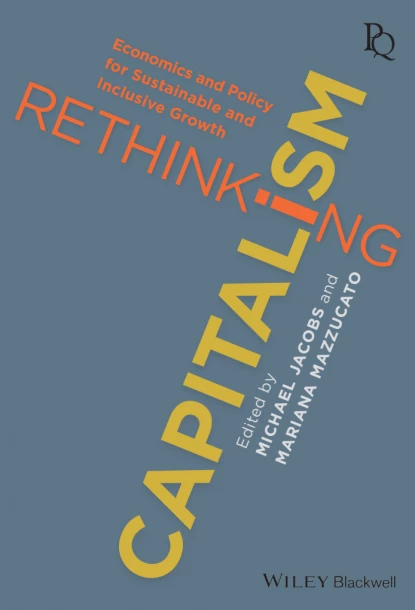“Globalization and technological change create huge challenges for modern economies, but they are not uncontrollable forces of nature. The economy we have is the economy we choose to build. It is time to make different choices, and show that capitalism can be remade.” — Prof. Mariana Mazzucato of the University of Sussex and Prof. Michael Jacobs of University College London, the editors of “Rethinking Capitalism.”
The shadows lengthen and the daylight shortens amid these elegiac end-of-summer evenings — but there’s a palpable feeling nowadays, in Washington and other capitals, that we’re approaching not just the sunset of a season, but the twilight of an era.
The sudden change in the policy discourse over the past year has shattered the familiar old contours of the globalization debate, with a “populist explosion” in the world’s developed economies forcing policymakers everywhere to reconsider the boundaries of “the art of the possible.” In many of the world's developed economies, a recalibration of globalization is under way.
In this insolite interim, the fraught phrase of Antonio Gramsci comes to mind: “The crisis consists precisely in the fact that the old is dying and the new cannot [yet] be born. In this interregnum, a great variety of morbid symptoms appear.”
Three incisive recent analyses illustrate the impassioned arguments that underscore this end-of-an-era feeling. Together, the analyses set the stage for the imminent publication of a new book of essays by a group of eminent economists, whose ideas may chart the way toward a more durable, more inclusive approach to globalization.
- First: An eloquent “grand sweep of history” essay in The Guardian by Martin Jacques – critiquing the laissez-faire the policy package broadly known as “neoliberalism” – declares bluntly that “we are witnessing the end of the neoliberal era. It is not dead, but it is in its early death throes.” Jacques discerns that “the causes of this political crisis, glaringly evident on both sides of the Atlantic, are much deeper than simply the financial crisis and the virtually stillborn recovery of the last decade. They go to the heart of the neoliberal project that dates from the late 1970s . . . [that] embraced at its core the idea of a global free market in goods, services and capital.”
- Second: Diagnosing how a phase of economic history may have run its course, Nobel Prize-winner Joseph Stiglitz (a former Chief Economist of the World Bank) in Project Syndicate asserts that the laissez-faire approach to globalization has reached its (il)logical conclusion: “The failure of globalization to deliver on the promises of mainstream politicians has surely undermined trust and confidence in the ‘establishment.’ . . . Neoliberals have opposed welfare measures that would have protected the losers [of globalization]. But they can’t have it both ways: If globalization is to benefit most members of society, strong social-protection measures must be in place. The Scandinavians figured this out long ago; it was part of [their] social contract. . . . Neoliberals elsewhere have not – and now, in elections in the US and Europe, they are having their comeuppance.”
- Third: A series of insightful columns by Martin Sandbu in The Financial Times – tracing an “insurrection [that] has been a long time coming” – explores the links among economic stress and social-class anxiety that provoked this year’s social eruption: “Over the past generation, the trajectory of the white working class has no doubt changed the most for the worse, compared with the previous generation.”
The history-minded reflections of Jacques, Stiglitz and Sandbu underscore the fact that many economists are still pondering how so many of their policy prescriptions went so badly wrong, opening the way for the global financial crisis.
Casting an even wider net, an analysis by the New York Times’ Thomas B. Edsall explores ideas from such scholars as Dani Rodrik and Robert Putnam of Harvard, Ian Buruma of Bard College and Michael Lind of New America. They urge the creation of “a clear program to refashion capitalism and globalization” to ease “the bewildering changes [wrought] by a global economy” among “middle- and working-class people seeking to move up the [economic] ladder.”
That’s a mighty tall order — but, luckily, that task is about to be energized by a new book of economic essays that seems likely to inspire a more constructive, can-do debate. (In terms of reading habits, I often endorse the dictum of Ralph Waldo Emerson, who borrowed a quip from the poet Samuel Rogers — “When a new book comes out, I read an old one” — but, in this case, I’ll make an emphatic exception.)
“Globalization and technological change create huge challenges for modern economies, but they are not uncontrollable forces of nature,” write Prof. Mariana Mazzucato of the University of Sussex and Prof. Michael Jacobs of University College London, the editors of the 10 essays (written by such luminaries as Stiglitz and Andrew G. Haldane, the chief economist of the Bank of England) in the new book, “Rethinking Capitalism: Economics and Policy for Sustainable and Inclusive Growth.” The book exhorts governments to embrace an imaginative vision: “The economy we have is the economy we choose to build. It is time to make different choices, and show that capitalism can be remade.”
The ambition of the essayists seems as sweeping as the book’s title — and, judging by the introduction by Mazzucato and Jacobs (which is already available online), the authors are eager to overhaul global capitalism from stem to stern. “Western capitalism came close to collapsing in 2007 and 2008, and [it] still has not recovered. . . . The capitalist economies of the developed world, which for 200 years transformed human society through an unparalleled dynamism, have over the past decade looked profoundly dysfunctional. . . . The problem is that these failings are not temporary: They are structural.”
The errors that led to the crash, say Mazzucato and Jacobs, occurred because flawed economic theories led to catastrophic policy misjudgments. “Mainstream economic thinking has given us inadequate resources to understand the multiple crises [that] contemporary economies now face. . . . We offer a critique of the orthodox notions of markets and ‘market failure.’ And we explain how a richer and deeper understanding of capitalism can generate . . . more innovative, inclusive and sustainable forms of growth and prosperity.”
Echoing an earlier Stiglitz book in diagnosing “capitalism and its discontents,” the new book’s approach will be familiar to those who have read Mazzucato’s celebrated work on innovation policy, “The Entrepreneurial State.”
“Investments in technological and organizational innovation, both public and private, are the driving force behind economic growth and development,” write the editors. Coordination between the private sector and the public sector is thus indispensable: “The creation of economic value is a collective process. Businesses do not create wealth on their own. No business today can operate without the fundamental services provided by the state,” such as strong education systems, robust infrastructure investments, leading-edge R&D and effective social-protection programs. “Economic output is co-produced by the interaction of public and private actors. . . . We need to acknowledge the interdependence of private enterprise and the public sector, of market and non-market activities.”
Mazzucato and Jacobs are buoyant in their Keynesian enthusiasm — one can almost hear their Keynesian allies cheering, “Take that, Margaret Thatcher!” — and most mainstream economists, after the neoliberal abdication of the Thatcher-scarred generation, seem to be joining the activist consensus in favor of closer coordination between the public and private sectors.
Mazzucato and Jacobs applaud the decision of the UK’s new Prime Minister, Theresa May, to reawaken “industrial strategy” as a Cabinet-level priority. (Like Keynesians everywhere, they’re probably enjoying the Schadenfreude as the Thatcherite party abandons that fundamentalist plank of Thatcherism.) Yet they seem measured in their expectations: “The inclusion of ‘industrial strategy’ . . . is promising if it signals a true integration of policy. It could even become the basis for a green transformation of the economy. . . . But it will require a radical strengthening of the civil service, reversing the cuts and ideological outsourcing of recent decades.”
Activist strategy-setters for pro-growth investment can take heart from Sandbu’s recent declaration in the FT, which seems fully in tune with Mazzucato's and Jacobs' pro-investment, pro-innovation approach: “Industrial policy need not be a dirty word. Standard economics provides the case for state involvement.”
As globalization-related policies seek greater staying-power by prioritizing social solidarity — by designing stronger social safety nets, rather than tolerating survival-of-the-fittest self-interest — many societies may soon be ready to move toward a more balanced, and thus more durable, form of globalization. As Mazzucato and Jacobs assert, we can indeed have the economy and the society that we actively choose to build: Well-targeted policies can both propel the leaders of the global economic contest and ease the plight of those who are momentarily on globalization's downside.
Envisioning such a new approach will be the long-term task for policymakers worldwide, as they try to shape a more resilient era of investment-led, innovation-focused, solidarity-minded globalization.



Join the Conversation